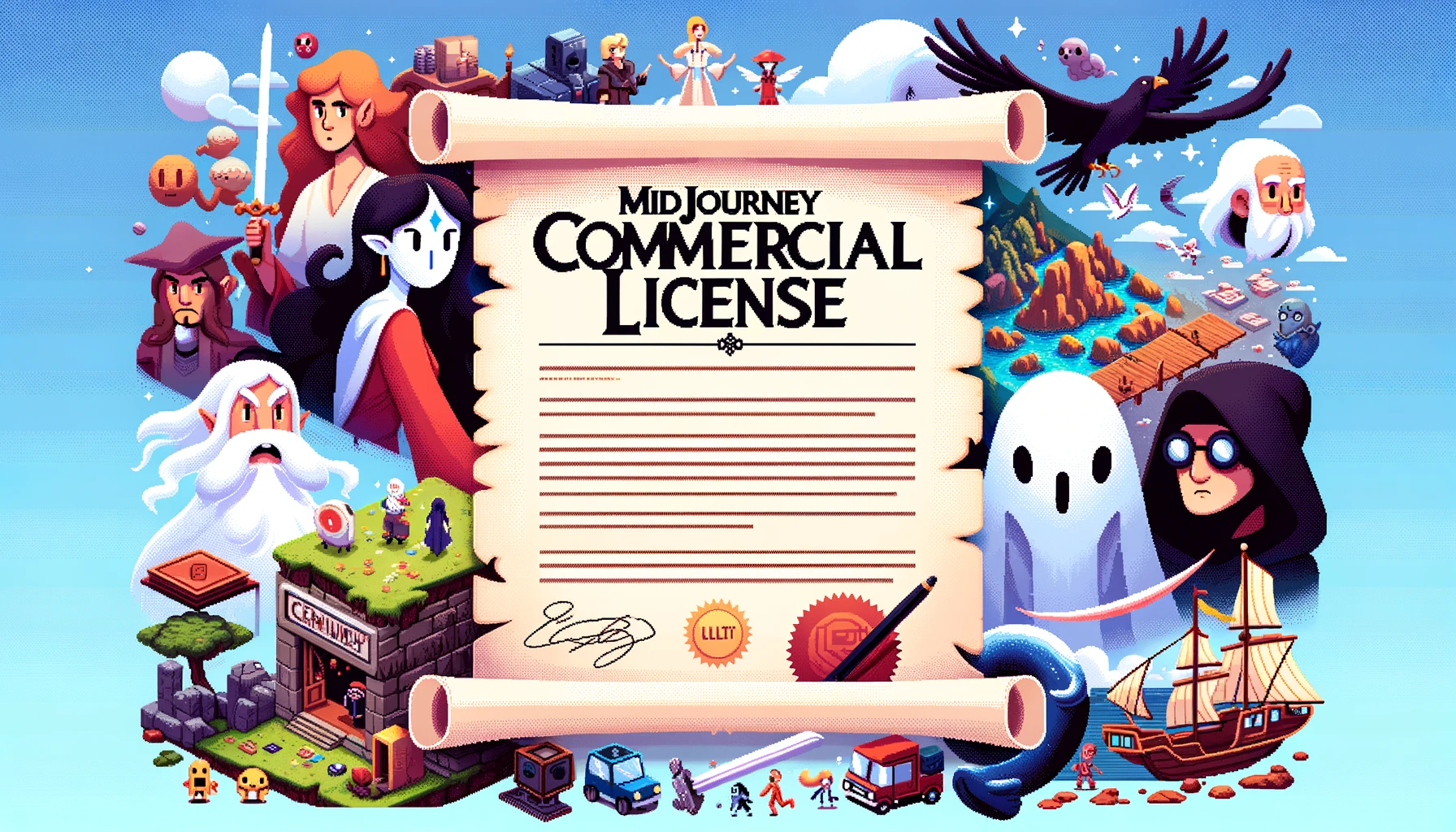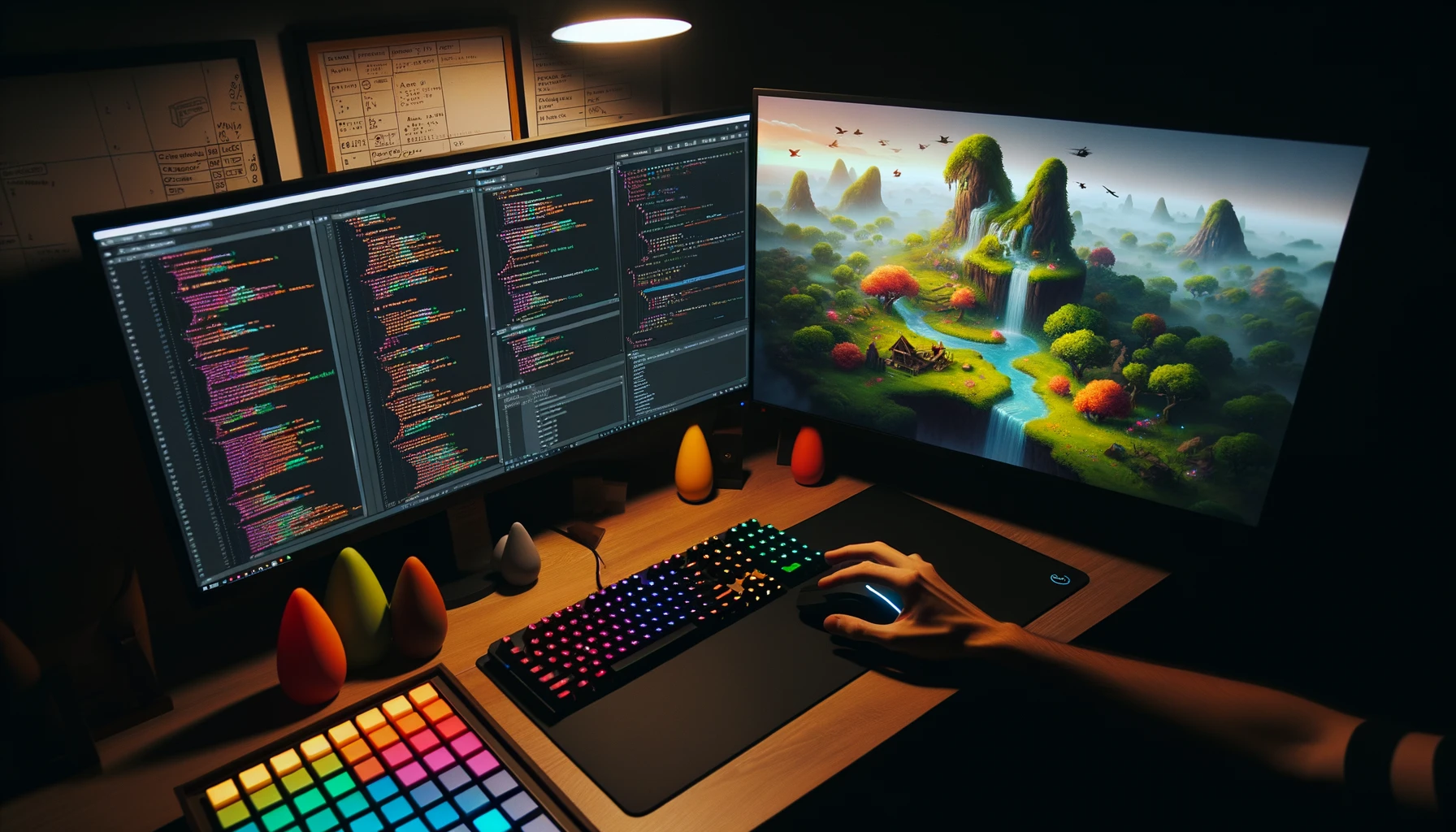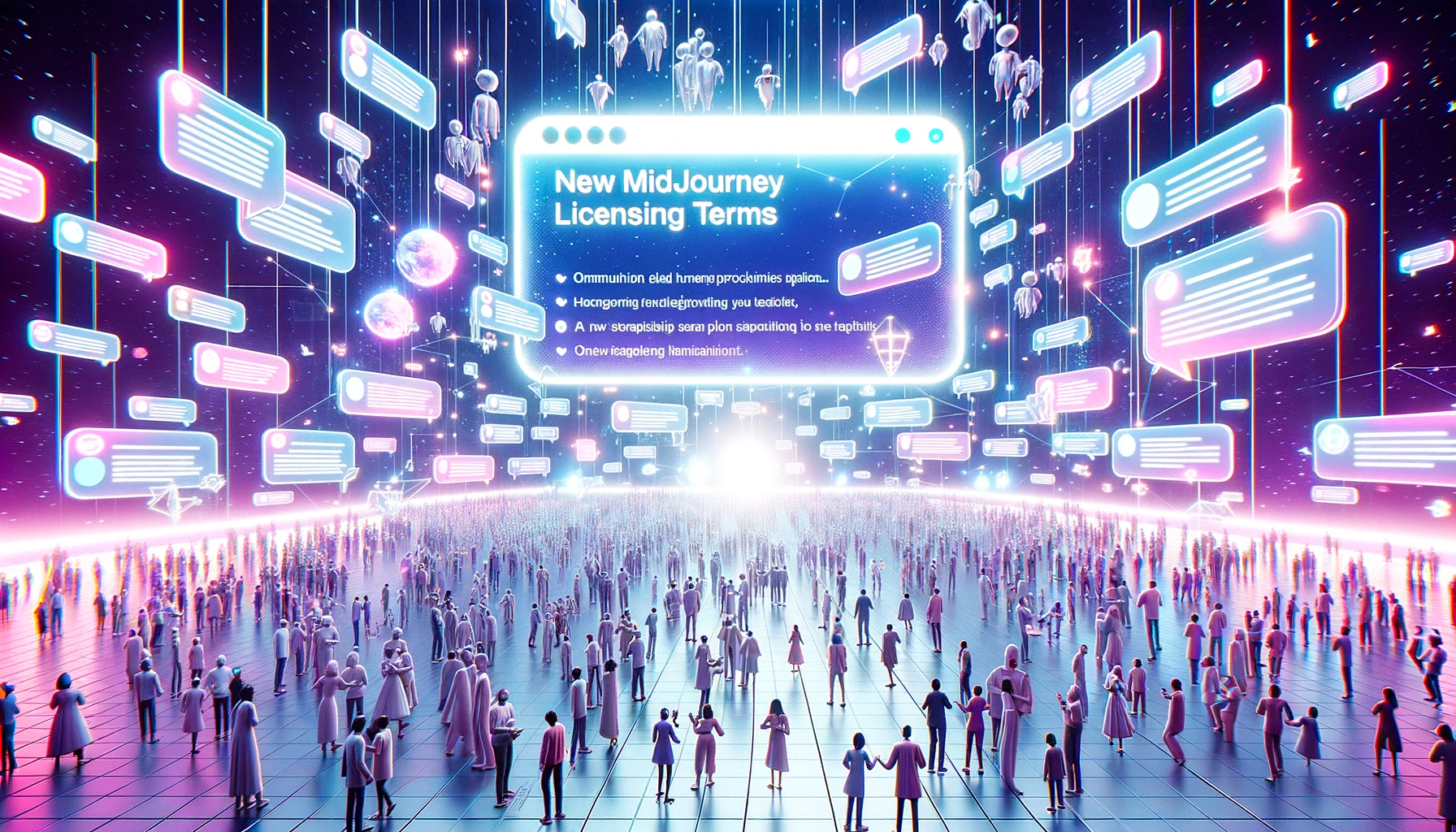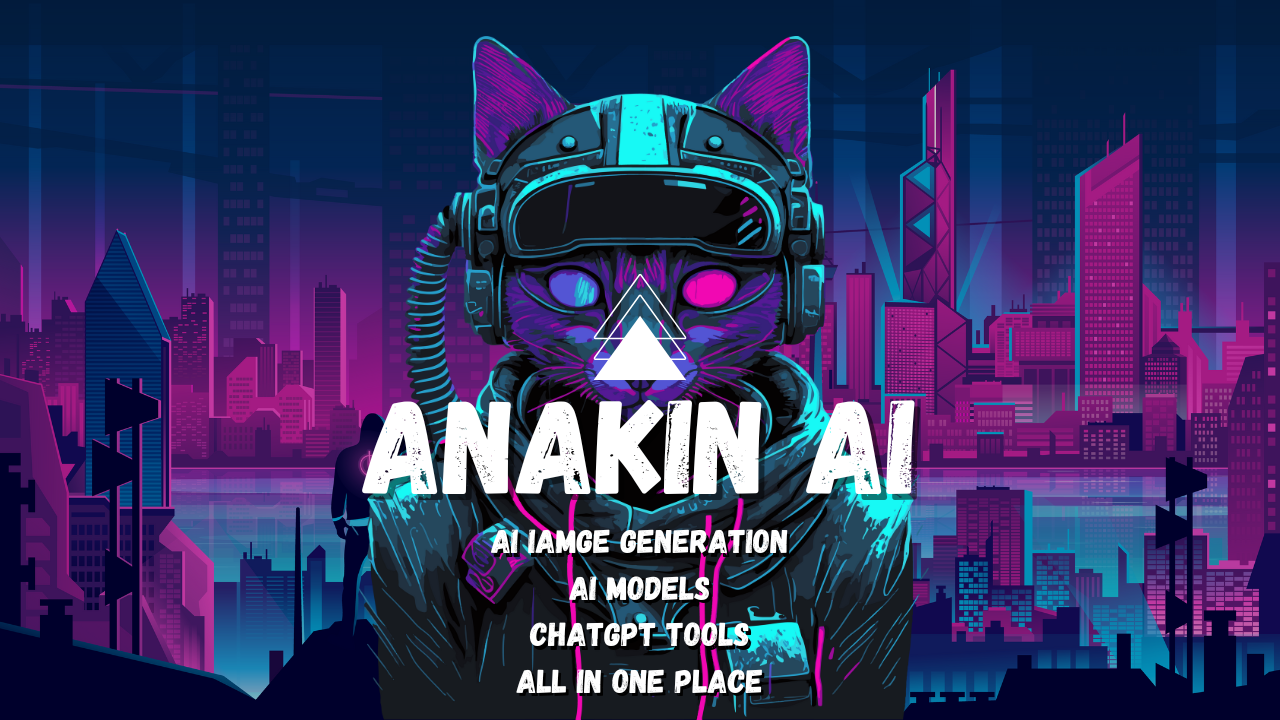Midjourney Policy Explained: Commercial Use | Copy Right Licence
Published on

Midjourney has been a game-changer in the realm of AI-generated art, offering a platform where both amateurs and professionals can create stunning visual assets. But as with any groundbreaking technology, the question of commercial use is a hot topic that has users buzzing with questions and opinions. This article aims to be your ultimate guide to understanding Midjourney's commercial use, breaking down the complexities of its licensing terms, community perspectives, legal implications, and much more.
Whether you're a game developer looking to incorporate Midjourney's assets into your next project, or a digital marketer curious about the legalities of using such content, this article has got you covered. We'll delve into the nitty-gritty details, providing you with the knowledge you need to navigate the world of Midjourney commercial use confidently.
Understanding Midjourney's New Licensing Terms for Commercial Use
What is Midjourney's Commercial License?
Midjourney's commercial license is a legal agreement that outlines the terms and conditions under which you can use the platform's generated assets for commercial purposes. In simple terms, it's the rulebook that tells you what you can and can't do with the art you create on Midjourney when you intend to make money from it.
Key Points:
- Ownership: The license grants you the right to own the assets you create.
- Usage: It specifies the scope of how you can use these assets, including distribution and modification rights.
- Limitations: The license may have certain restrictions, such as not allowing the use of assets for specific types of commercial activities.
The commercial license is particularly crucial for businesses and freelancers who plan to use Midjourney's assets in projects that will generate revenue. Understanding the terms of this license can save you from potential legal hassles down the line.
Free vs Paid Accounts: What's the Difference?
When it comes to Midjourney's commercial use, the type of account you hold—free or paid—plays a significant role in determining your rights and limitations. While both account types allow you to create assets, the licensing terms differ substantially.
For Free Accounts:
- Assets are generally under a Creative Commons - Noncommercial license.
- You can use the assets for personal projects but not for commercial ones.
- Public sharing is usually the default setting.
For Paid Accounts:
- You hold the copyright to the assets you create.
- You have more freedom in how you can use the assets commercially.
- You can opt-out of public sharing settings.
Steps to Upgrade to a Paid Account:
- Log in to your Midjourney account.
- Navigate to the 'Account Settings' page.
- Select the 'Upgrade to Pro' option.
- Follow the on-screen instructions to complete the payment process.
Understanding the difference between free and paid accounts is essential for anyone considering Midjourney for commercial projects. While a free account might be sufficient for personal use or experimentation, a paid account offers the legal protections and freedoms necessary for serious commercial endeavors.
Can You Use Midjourney commercially? Legal Aspect Explained
What are the U.S. Copyright Laws Concerning Midjourney?
In the United States, the copyright office has made it clear that AI-generated art cannot be copyrighted. This means that while you can publish and distribute the art, you can't prevent others from using it. This has implications for Midjourney users, especially those based in the U.S.
Key Points:
- No Copyright: AI-generated art is not eligible for copyright protection.
- Implications: You can use the art but can't prevent others from doing the same.
Steps to Navigate U.S. Copyright Laws:
- Be aware that your Midjourney-generated art is not copyrighted.
- Use watermarks or other identifiers to signify your work, even though this won't offer legal protection.
Understanding the U.S. copyright laws can help you make informed decisions about how to use Midjourney assets in your commercial projects.
Global Legal Considerations
The legal landscape surrounding AI-generated art is still a topic of debate globally. Different countries may have different stances, and the situation is fluid, with potential for changes in legal status.
Key Points:
- Varied Laws: Different countries have different copyright laws concerning AI art.
- Fluid Situation: Legal perspectives on AI-generated art are still evolving.
Steps to Stay Updated on Global Laws:
- Regularly check international copyright law updates related to AI art.
- Consult with a legal advisor who specializes in intellectual property rights for digital assets.
Being aware of the global legal considerations can help you navigate the complexities of using Midjourney for commercial purposes, regardless of your geographical location.
Can Artist Use Midjourney for Commerical Use?

The general sentiment leans positive, especially with the recent changes in licensing terms that offer more freedom and ownership to users. However, this doesn't mean that there are no questions or concerns.
Key Points:
- Positive Reception: The new terms have been largely well-received as they align with what users expect when they think of "commercial use."
- Questions Remain: Despite the positive outlook, users still have questions about the specifics, such as pricing for commercial usage packages and limitations on certain types of commercial activities.
Sample Prompts for Gauging Community Sentiment:
- Participate in Midjourney forums and Reddit threads to understand what users are talking about.
- Conduct a quick survey among Midjourney users to gather opinions on commercial use.
- Keep an eye on updates and announcements from Midjourney that address user concerns.
Understanding the pulse of the community can offer valuable insights into how Midjourney's commercial use policies are likely to evolve, and what you can do to stay ahead of the curve.
Can Game Developers Use Midjourney for Commerical Usage?

Midjourney offers a unique opportunity for game developers, especially those who may lack artistic skills. The platform can generate a wide range of assets that can be used in game development.
Certain platforms, like Steam, have specific requirements for AI-generated art. They may require proof that you have the copyright to all the training data used in generating the art.
Key Points Game Devs Need to Know About:
-
Asset Generation: Create characters, landscapes, and more.
-
Challenges: Achieving character consistency across multiple images can be tricky.
-
Platform Rules: Some platforms have strict rules about AI-generated art.
-
Proof of Copyright: You may need to prove copyright ownership of the training data.
How Can Game Dev Leverage Midjourney:
- Read the terms and conditions of the platform where you intend to publish or sell your game.
- Plan out the types of assets you'll need for your game.
- Use Midjourney to generate these assets, keeping in mind the style and theme of your game.
- Test the assets within the game environment for consistency and quality.
The Midjourney Licensing New Terms: What You Must Know

The new licensing terms have been a breath of fresh air for many in the Midjourney community. Users appreciate the clarity and the empowerment these terms bring, especially when it comes to ownership and the scope of usage for commercial purposes.
Why Users are Happy:
- Ownership Rights: The new terms clearly state that users own the assets they create, which was a gray area in the past.
- Freedom to Use: The terms are less restrictive, allowing for a broader range of commercial applications.
The positive reactions to the new terms indicate a step in the right direction for Midjourney, making it an even more attractive option for commercial endeavors.
While the new terms have been largely positive, they aren't without their share of questions and concerns. Some users are curious about how these changes will affect the pricing structure for commercial usage packages, which were previously set at specific rates.
Common Concerns:
- Pricing: Will the new terms lead to a change in the pricing structure for commercial use?
- Scope: Are there still any limitations or restrictions that users should be aware of?
By staying informed and engaged, you can navigate through any concerns and make the most of what Midjourney has to offer for commercial use.
Conclusion
From understanding Midjourney's new licensing terms to exploring community perspectives and legal implications, this article has aimed to provide a comprehensive guide to Midjourney's commercial use. As the landscape of AI-generated art continues to evolve, staying informed and engaged is key to making the most of the opportunities that Midjourney offers for commercial endeavors.
FAQ
Can I use Midjourney for commercial?
Yes, you can use Midjourney for commercial purposes, especially if you have a paid account that grants you the copyright to the assets you create.
Is Midjourney copyright free?
In the U.S., AI-generated art like that from Midjourney is not eligible for copyright. However, the platform's terms of service grant different rights based on whether you have a free or paid account.
Can you license Midjourney?
Midjourney offers a commercial license that outlines the terms under which you can use the platform's generated assets for commercial purposes.
Can you sell Midjourney art?
Yes, you can sell art generated through Midjourney, especially if you have a paid account. However, be aware of the copyright laws in your jurisdiction as they can affect your rights to the generated assets.
